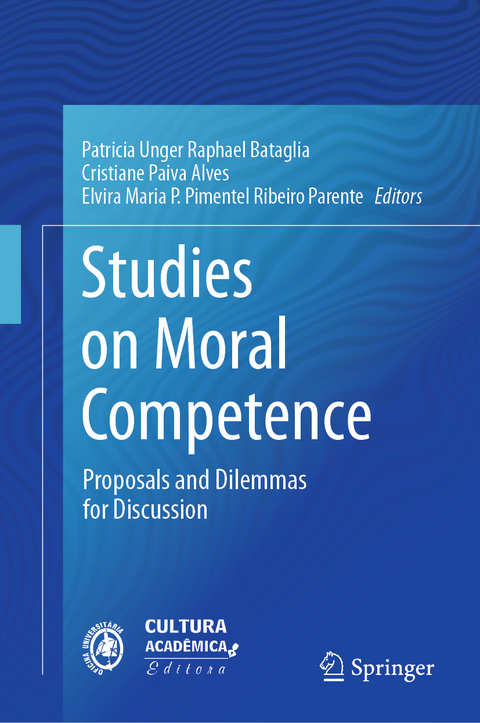
Studies on Moral Competence
Springer International Publishing (Verlag)
978-3-031-52138-6 (ISBN)
This book shows how to use discussions of moral dilemmas as a strategy to develop moral competence in children and youth in educational environments using the Konstanz Method of Dilemma Discussion (KMDD). This method was developed by the German psychologist Georg Lind (1847-2021), who defines moral competence as an ability to solve problems and conflicts based on moral principles or values, through reflection, dialogue and deliberation, instead of using force, violence, deception and manipulation. According to Lind, this ability can be developed in children and youth through KMDD.
The book has two parts. The first part brings together an original chapter written by Georg Lind about his decades of research on assessment and education of moral competence, and other 13 chapters written by different authors analyzing the theoretical foundations of moral development and moral competence as psychological constructs and their applications to different aspects of social life,as well as empirical research analyzing the application of different methods of dilemma discussion in educational contexts. The second part presents 20 moral dilemmas to be used in dilemma discussion sessions.
Studies on Moral Competence: Proposals and Dilemmas for Discussion is the English edition of a book originally published in Portuguese for the Brazilian market and will be of interest to teachers and researchers interested in learning about the theoretical foundations and possible applications of an effective method to develop moral competence in educational environments.
The translation was done with the help of artificial intelligence. A subsequent human revision was done primarily in terms of content.
Patricia Unger Raphael Bataglia is a professor at the Department of Education and Human Development of the School of Philosophy and Sciences of the São Paulo State University (UNESP) in Marília, Brazil, and the leader of the Research Group on Moral Psychology and Integral Education (GEPPEI). She holds a PhD in Social Psychology from the University of São Paulo, Brazil. Cristiane Paiva Alves is a professor at the School of Philosophy and Sciences of the São Paulo State University (UNESP) in Marília, Brazil, and vice-leader of the Research Group on Moral Psychology and Integral Education (GEPPEI). She holds a BA in Occupational Therapy from UNESP and a PhD in Special Education from the Federal University of São Carlos (UFSCar), Brazil. She also holds a title of specialist in Neurology and Rehabilitation of Upper Limbs from UFSCar. Elvira Maria P. Pimentel Ribeiro Parente holds a BA and a Master's degree in Education from the State University of Feira de Santana (UEFS), Brazil, and is a PhD candidate at the Graduate Program in Education of the State University of Campinas (UNICAMP), Brazil. She is the coordinator of the Group of Studies on Moral Education (GEEM) and a member of the Group of Research and Studies on Moral Education (GEPEM), both at Feira de Santana, Brazil.
Part I - Studies on Moral Competence.- 1. Assessing and Educating Moral-Democratic Competence.- 2. Brazilian Research on Moral Competence.- 3. The Three Classical Theories of Normative Ethics and their Implication in Psychology.- 4. To Study Fascism: A Reflection from the Development of Moral.- 5. Moral Judgment Competence: The Main Theoretical Contributions of Piaget, Kohlberg and Lind.- 6. Georg Lind (1947-2021) and Moral Competence: An Alternative for Contemplation of Complexity in Moral Development.- 7. Moral Competence, Religiosity, and Spirituality.- 8. Moral Competence as an Antecedent to Transformational Leadership.- 9. Moral Competence in Child and Adolescent Care Institutions.- 10. Moral Competence and Education: Some Contributions.- 11. Moral Competence: Challenges in the School Context.- 12. The Discussion of Dilemmas for the Promotion of Competence and Moral Values in the School Environment.- 13. Balancing Loyalty and Honesty: Nurturing Moral Competence through Dilemmas.- 14. Discussion of Dilemmas in Different Contexts.- Part II - Dilemmas for Discussion.- 15. Robert's Dilemma.- 16. In Search of Dignity.- 17. To Report or not to Report? That is the Question!.- 18. Lilian's Dilemma: Sexuality in Professional Performance in Psychology.- 19. The Dilemma of Childbirth.- 20. Childcare.- 21. Parade at School.- 22. Online Classes and the Case of the Muted Microphone.- 23. Monique's Beautiful Glasses.- 24. Maria's Dilemma.-25. The Teacher's Decision.- 26. Jordana, the Rebel Student.- 27. Robot Sophia.- 28. Moral Choices: The Employee and the Doctor.- 29. School Violence: Between Lives and Ideals.- 30. A Teacher Facing an Authoritarian and Violent Family.- 31. David's Dilemma.- 32. To Argue or to Obey?.- 33. Substitute Teacher.- 34. Madam, will you say Something?.
| Erscheinungsdatum | 15.03.2024 |
|---|---|
| Zusatzinfo | XIX, 234 p. 3 illus. |
| Verlagsort | Cham |
| Sprache | englisch |
| Maße | 155 x 235 mm |
| Themenwelt | Geisteswissenschaften ► Psychologie ► Entwicklungspsychologie |
| Geisteswissenschaften ► Psychologie ► Pädagogische Psychologie | |
| Geisteswissenschaften ► Psychologie ► Psychoanalyse / Tiefenpsychologie | |
| Geisteswissenschaften ► Psychologie ► Sozialpsychologie | |
| Medizin / Pharmazie ► Medizinische Fachgebiete ► Psychiatrie / Psychotherapie | |
| Schlagworte | Ethics Education • Georg Lind • Konstanz Method of Dilemma Discussion • moral competence • Moral-Democratic Competence • Moral Development • Moral Education • moral psychology |
| ISBN-10 | 3-031-52138-2 / 3031521382 |
| ISBN-13 | 978-3-031-52138-6 / 9783031521386 |
| Zustand | Neuware |
| Informationen gemäß Produktsicherheitsverordnung (GPSR) | |
| Haben Sie eine Frage zum Produkt? |
aus dem Bereich


